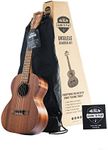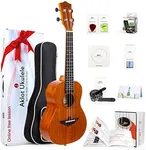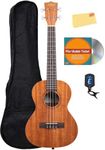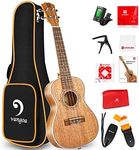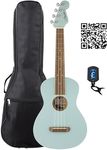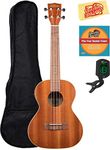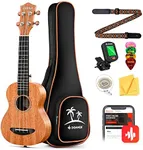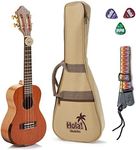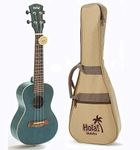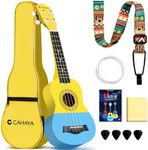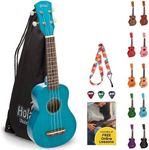Buying Guide for the Best Tenor Ukuleles
Choosing the right tenor ukulele can be a delightful experience if you know what to look for. Tenor ukuleles are larger than soprano and concert ukuleles, offering a deeper, richer sound and more room on the fretboard, making them a popular choice for both beginners and experienced players. To find the best tenor ukulele for you, consider the following key specifications and how they align with your needs and preferences.Body MaterialThe body material of a tenor ukulele significantly affects its sound quality and durability. Common materials include mahogany, koa, and spruce. Mahogany offers a warm, balanced tone and is quite durable, making it a good choice for beginners. Koa, a traditional Hawaiian wood, provides a bright, rich sound and is often preferred by more experienced players. Spruce is known for its bright, clear tone and is often used in higher-end models. Consider what kind of sound you prefer and how much you plan to play when choosing the body material.
Neck and FingerboardThe neck and fingerboard of a tenor ukulele affect playability and comfort. Common materials for the neck include mahogany and maple, while fingerboards are often made from rosewood or ebony. A smooth, well-crafted neck and fingerboard make it easier to play chords and melodies. If you have larger hands or plan to play more complex pieces, look for a ukulele with a wider neck and fingerboard for added comfort.
StringsThe type of strings on a tenor ukulele can influence its sound and playability. Nylon strings are the most common and provide a warm, mellow tone. Fluorocarbon strings offer a brighter, clearer sound and are more durable. Some players prefer wound strings for a richer, more resonant tone. Consider the type of music you want to play and your personal preference for string feel and sound when choosing strings.
Tuning PegsTuning pegs, or tuners, are crucial for keeping your tenor ukulele in tune. There are two main types: friction tuners and geared tuners. Friction tuners are traditional and lightweight but can be harder to adjust accurately. Geared tuners are more precise and easier to use, making them a better choice for beginners or those who want more stable tuning. Think about how often you will need to tune your ukulele and your comfort level with tuning when selecting tuning pegs.
Size and WeightWhile all tenor ukuleles are generally the same size, there can be slight variations in body depth and weight. A lighter ukulele is easier to hold and play for extended periods, which can be important for younger players or those with smaller frames. However, a heavier ukulele might offer a more robust sound. Consider your physical comfort and how you plan to use the ukulele when evaluating size and weight.
FinishThe finish of a tenor ukulele not only affects its appearance but also its sound. Common finishes include satin and gloss. A satin finish provides a more natural look and feel, allowing the wood to resonate more freely, which can enhance the sound. A gloss finish offers a shiny, polished look and can protect the wood better but might slightly dampen the sound. Choose a finish based on your aesthetic preference and how you want your ukulele to sound.
